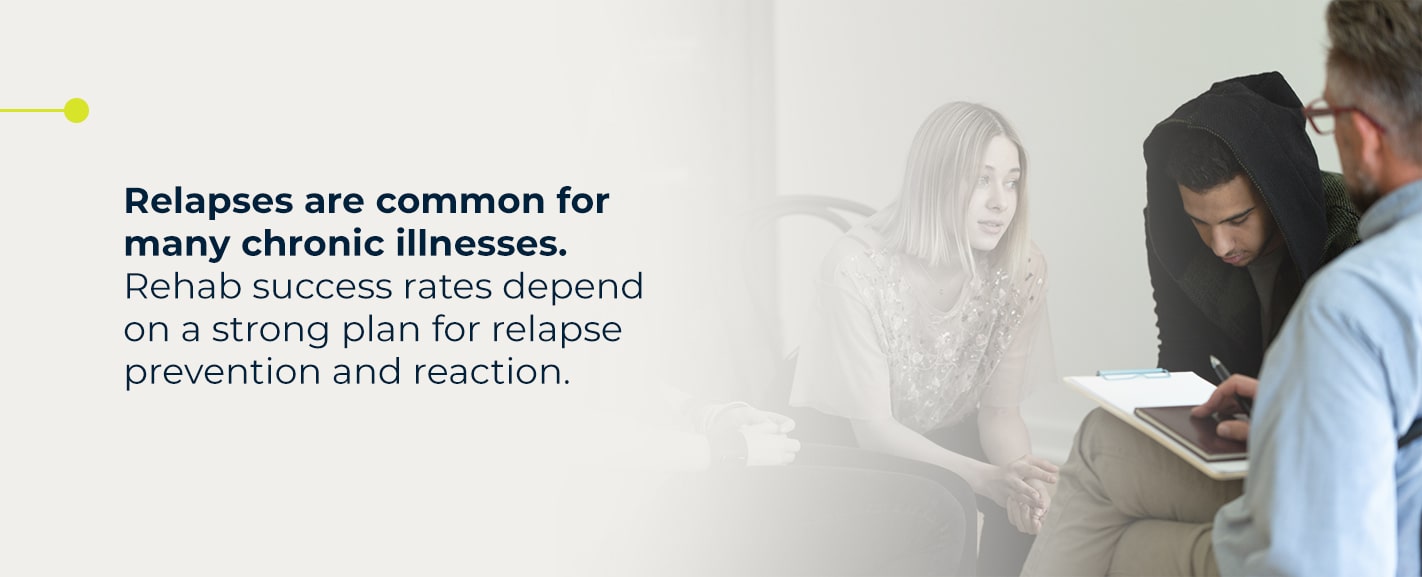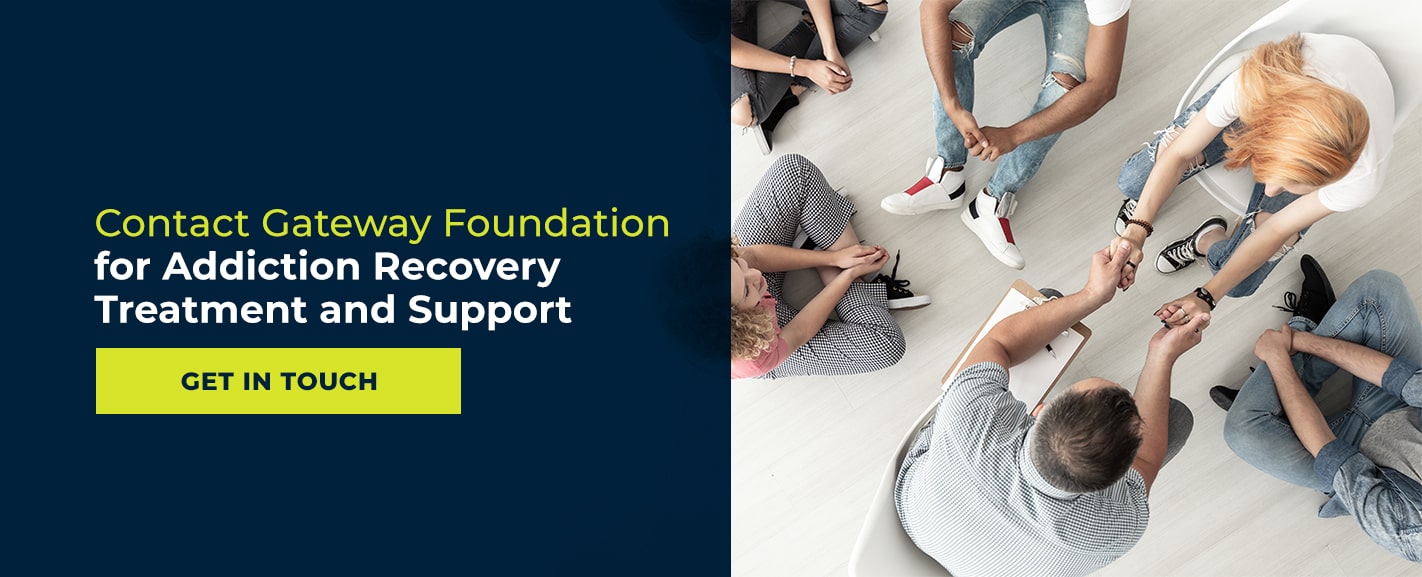- Sep 6
- Drug Addiction Treatment
Substance use disorder is challenging — it can affect all aspects of someone’s life, including their interpersonal relationships, professional accomplishments and their physical and mental wellbeing. Successful rehabilitation saves lives. Those with addictions and their loved ones need proven, reliable recovery support.
Addiction is a chronic disorder. Just like heart disease or asthma, substance use disorder is not curable, but it is treatable. Those with substance use disorder can live healthy, happy lives with access to professional care. Recovering from a substance use disorder requires thorough treatment and aftercare. With professional help, recovery is achievable. Long-term support helps keep the patient on the right track during life after rehab.
What Is Aftercare? Why Is It Important?
Aftercare programs offer long-term guidance and support to those who have undergone addiction recovery treatment. This step is an integral part of any addiction recovery process and is often necessary for sustained recovery. Patients who have completed treatment and are ready to reenter the community all need some level of aftercare. Immersion back into their community with continued support lends itself to long-term success.
While the treatment period is often immersive and intensive — the patient might live in a facility for a number of days or weeks — aftercare is usually outpatient and less intensive. Aftercare can take place with one or more meeting sessions per week, which might decrease over time to one meeting each month or fewer. Many patients continue aftercare services for many years. Substance use recovery aftercare can involve several elements. The patient might engage in:
- Cognitive behavioral therapy: Cognitive behavioral therapy is often an essential part of treatment and aftercare. It helps patients change their patterns of thought and behavior while providing healthy coping mechanisms for long-term changes.
- Trauma therapy: Trauma can be both physical and psychological. It can stem from one event or repetitive events. Some people who experience trauma use substances as a coping mechanism, leading to a substance use disorder. For that reason, trauma therapy programs are a necessary component of treatment and aftercare for many patients.
- Group recreational events: Group counseling and group activities with other patients are key forms of support. Being able to relate to others with substance use disorders helps the patient feel less alone and isolated, feel uplifted and stay on a path of recovery. Fun group activities also provide healthy, substance-free hobbies.
- 12-step programs: A 12-step program offers lifelong support and resources for someone with a substance use disorder. Many people have found success and maintained substance-free lives using the 12-step program. After initial withdrawal management and inpatient care, joining a 12-step program can have many benefits.
- Mindfulness programs: Mindfulness therapy can help reduce anxiety and depression by encouraging a patient to focus on the present moment. Many patients are affected by events in the past or worried about events in the future. They may then find it challenging to focus on healthy, substance-free living. Continued mindfulness therapy can help manage difficult feelings, recognize triggers and prevent relapse.
- Sober living: A sober living home is a bridge between treatment and reentering the community. It offers a place to readjust to a substance-free lifestyle. This option is especially helpful if the environment at home is less than ideal, containing triggers or substance temptations.
Everyone’s aftercare needs are unique. Another crucial factor is monitoring — aftercare allows health professionals to detect recent or impending relapses. Catching these warning signs as soon as possible can help keep the patient safe. With careful monitoring, a health professional will be able to determine if a patient needs their recovery plan adjusted. Sometimes, a patient needs to begin or resume more intensive care.
Proper aftercare decreases the likelihood of relapse and provides intervention in the event of a relapse. It helps the patient build the tools for self-sufficiency, giving them the chance to return to normal life with uplifting support. Aftercare also helps the patient stay accountable, which can be a powerful incentive for remaining substance-free.
Patients often stay involved with some level of aftercare for many years after initial treatment. The frequency and intensity of the aftercare might decrease with time — after a few years, the patient might continue to attend weekly or monthly meetings.

Relapse Prevention
Relapses are common for many chronic illnesses. Rehab success rates depend on a strong plan for relapse prevention and reaction. Recovering from a substance use disorder takes time, and relapses often occur. Between 40 and 60% of those with substance use disorders experience a relapse after treatment.
A relapse is not a personal failure — it’s simply an indication that resumed, modified or new treatment is necessary. With that said, preventing relapse can be important for health and wellbeing. Continued aftercare can help minimize the risk of a relapse.
Benefits of Alumni Support Programs
One of the most useful aftercare resources after completing treatment is an alumni program. Alumni program events let the patient stay connected with their treatment teams and fellow former patients. Nurturing and strengthening these interpersonal bonds can help the patient sustain long-term recovery.
An alumni support program should include regular events to keep patients engaged. Events can be explicitly about substance use disorder recovery, such as a 12-step meeting. They can also be active, creative and social. Events might incorporate activities like cookouts, bowling, volunteering, painting or hiking.
Alumni events help encourage healthy socialization and provide substance-free activities. Physical activities and healthy creative outlets promote stronger mental health. At the same time, forming lasting connections with other patients can make a big difference for continued recovery. Other patients will understand the unique personal struggles involved with substance use recovery.
Building Support
After treatment, patients need a strong network of support. Loved ones, health professionals and even social acquaintances play a key role in addiction recovery. The patient’s support network should include medical doctors, counselors, other former patients, friends and family, which comprehensive aftercare can help a patient build.
Those at home can help by encouraging new, substance-free hobbies, learning and avoiding common relapse triggers, removing substances from the environment and showing care, love and optimism. Being in a healthy, substance-free, and positive environment can put the patient on the path toward recovery.
Addiction is a complex disorder, often with deep-rooted causes such as genetics, family history or trauma. Healing from substance use disorder takes years of dedication and support.
Contact Gateway Foundation for Addiction Recovery Treatment and Support
When you or someone you love experiences addiction, it can feel like there’s no light at the end of the tunnel. Addiction recovery is possible. With professional treatment and long-term aftercare, those with substance use disorders can live fulfilling, substance-free lives.
If you’re looking for relief and safety, contact Gateway Foundation recovery center. At Gateway Foundation, our caring staff has been providing high-quality, evidence-based treatment for over 50 years. We offer withdrawal management, inpatient treatment, partial hospitalization, outpatient programs and sober-living homes throughout Illinois. With our aftercare services, we are with you for life. To learn more about substance use recovery with Gateway Foundation, contact us today.



